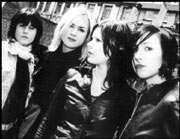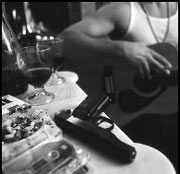SAHARA HOTNIGHTS
MOONEY SUZUKI, YOUR ENEMIES FRIENDS Graceland, 381-3094, $8 adv.
9:30 p.m. Sat., Sept. 28
SAHARA HOTNIGHTS have erased years from my life.
That’s not to suggest anything bad about this quartet of foxy Swedish twentysomethings. It’s just that listening to the band has sent me back to being 15 years old, discovering the seductively brassy voice of Vice Squad singer Beki Bondage and the fiercely coy yelp of Runaways’ siren Cherie Currie, and feeling a certain confusing interest in “bad girls.”
However, Sahara Hotnights is more than just a throwback or novelty act, as evidenced by their recently released American debut, Jennie Bomb (Jetset Records). The 11-song album is a fitful, fun blast of neo-proto-punk that sounds like a perfect hybrid of female-fronted Mohican hardcore (i.e., Action Pact, Vice Squad) and punk precursors the Sweet.
“We discovered punk stuff a little later on,” explains bassist Johanna Asplund, from her Malmo, Sweden, home. “The main reason we started to play music was that we thought Nirvana was cool.”
Johanna, along with her guitarist sister, Jennie Asplund, started the band as bored preteens in 1993, with lead vocalist/ guitarist Maria Andersson and drummer Josephine Forsman. After self-releasing the 1997 EP, Suits Anyone Fine, and a string of singles on Swedish imprint Speech, the group signed to RCA International, bowing with a full-length, C’mon Let’s Pretend, in 1999. The album was a major hit in Scandinavia, earning two Swedish Grammy nominations. Jennie Bomb, released a year ago overseas, also enjoyed similar critical and commercial success.
The band’s sophomore album features an angrier—some might even say sassier—attitude than its predecessor. Johanna contends that their goal wasn’t to change the band’s style completely, but merely to keep things exciting. “It’s more fun to play fast songs,” she explains, “and we get more excited playing angry, fast songs.” Having successfully conquered their homeland, the young rogues have set out to seduce America over the course of a seven-week U.S. tour with N.Y.C. fuzz-punks Mooney Suzuki.
PART OF THE CURRENT Swedish Invasion—which includes the Hives, (International) Noise Conspiracy, the Hellacopters, Cato Salsa Experience, and Backyard Babies, to name a few—Sahara Hotnights and their Scandinavian brethren are often criticized for coming off looking and sounding like facsimiles, closely studied copycats of ’60s/’70s American and U.K. outfits. According to Johanna, her own band’s aesthetic similarities stem innocently from language barriers. “When we were kids, there never were Swedish bands that we wanted to listen to,” the bassist says. “We thought it was cool to sing in English. And it is cooler, I think.”
So, in learning the, er, ins ‘n’ outs of rock music, it could be argued that many Swedish kids adopt the fashion and aesthetics of their favorite foreign bands with the same rationale as for singing in English: That’s just the way they think it’s supposed to be done.
“It’s a good thing that we don’t sing in Swedish,” says Johanna, “because now bands like [Sweden’s Radiohead-esque poppers] Kent have a really difficult time translating their lyrics. I think their music is not as good in English as it is in Swedish.”
But the success of Sahara Hotnights is certainly not due to its English-only modus operandi. The group ultimately writes catchy songs and plays them with aplomb. Jennie Bomb runs its 33-minute course in a nearly constant barrage of hook-filled sing-alongs but manages to remain varied from one track to the next. “No Big Deal” features new-wave hooks reminiscent of early Elastica, while “Only the Fake Survive” shudders like Joan Jett fronting L7.
And while song titles like “Alright, Alright (Here’s My Fist, Where’s the Fight?)” make Sahara Hotnights sound pretty vicious, do the band members consider themselves to be a tough, brawling bunch?
“Not really,” Asplund laughs. “Maybe when we’re onstage, but we’re nice otherwise.”







